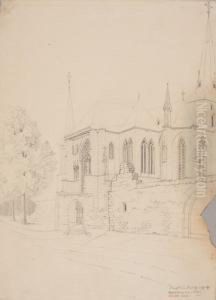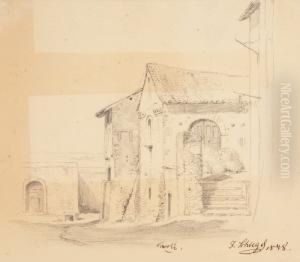Hermann Nebel Paintings
Hermann Nebel was a German painter known for his contributions to the New Objectivity movement, which emerged in the 1920s as a counter-movement to Expressionism. Born on July 1, 1893, in Karlsruhe, Germany, Nebel grew up during a period of significant artistic and cultural changes in the country. His early exposure to art came through his father, who was a decorative painter, sparking Nebel's interest in pursuing a career in the arts.
Nebel studied at the Academy of Fine Arts Karlsruhe, where he was influenced by the likes of Wilhelm Trübner and Hans Thoma, who were associated with the academy. Throughout his career, Nebel was known for his sharp and critical eye, often depicting scenes of urban life and the social issues of his time with a sense of realism and sometimes satire. His work was characterized by a focus on the human figure, often placed in compositions that highlighted the isolation and alienation of individuals in modern society.
During the 1920s, Nebel became associated with the New Objectivity movement, which sought to depict reality in a clear-eyed and unsentimental manner. His work from this period often reflected the disillusionment and cynicism that followed World War I, echoing the sentiments of a generation that had been profoundly affected by the conflict.
Despite his affiliation with the New Objectivity movement, Nebel's work remained relatively independent, and he never fully subscribed to any one particular style or group. He continued to evolve as an artist, exploring different subjects and methods of representation throughout his career. However, his work from the 1920s and 1930s is often considered some of his most significant.
Nebel's career, like that of many other artists of his generation, was disrupted by the rise of the Nazi regime. His work was deemed 'degenerate' by the Nazis, and he faced significant challenges during this period. Nevertheless, he continued to paint and exhibit where possible, although his opportunities were severely limited.
After World War II, Nebel's work gained renewed attention, although he never achieved the same level of fame as some of his contemporaries. He continued to paint until his later years, with his work reflecting a continued engagement with the social and political landscapes of Germany.
Hermann Nebel died on December 3, 1972, in Karlsruhe. His legacy is embodied in his contributions to the New Objectivity movement and his unflinching portrayal of the human condition. Nebel's paintings are held in various German museums and continue to be appreciated for their historical and artistic significance.

